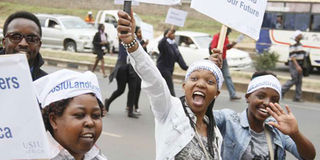Breaking News: At least 10 feared to have drowned in Makueni river
As a nation, we subscribe to a strange kind of democracy

United States International University-Africa students protest along Thika Road on July 13, 2016 over the institution's land dispute with US-based Kenyan Dr. George Kiongera. PHOTO | MARTIN MUKANGU | NATION MEDIA GROUP
What you need to know:
- Many of the so-called leaders are ready to kill in order to ascend to power – not to serve their fellow Kenyans, but to gain access to resources.
- Many leaders will do anything to remain in power under whatever circumstances.
Some day last week, there was a rare protest on the Thika Highway by students and staff of the United States International University. They were protesting against the sale of land which they claimed belonged to their institution.
After reading that story, my mind went back to the events of 2002 at Uhuru Park when Moi’s rule was coming to an end. There was great rejoicing and shouting and name calling. It was as though a big load had been removed from the shoulders of Kenyans.
The majority of Kenyans celebrated and sang songs while, of course, others felt that things had not gone right. The celebration was shortlived as it emerged that there was noise at the Bomas of Kenya where a constitutional debate was going on.
It was said that delegates were acting in accordance with the dictates of their tribal leaders. Then there were serious disagreements about some MoU, and the unity of those who had joined hands to win the elections was no more. These arguments culminated in the Referendum of 2005, which saw the birth of ODM.
We all remember the sad events of 2007/08 which were a result of our selfishness and carelessness. Many of the so-called leaders are ready to kill in order to ascend to power – not so much to serve their fellow Kenyans, but to gain access to resources.
REMAIN IN POWER
Land grabbing has, of course, been a popular pastime with the political class. Many of them will do anything to remain in power under whatever circumstances. In the process, the push and pull will obviously slow down development work.
Last week, we saw a change of guard in the UK. Prime Minister David Cameron had made a major gamble by calling for a referendum to decide whether or not Britain should move out of the European Union. He campaigned hard to convince the English people to remain but this did not work.
No sooner was the verdict announced than Cameron declared that he would resign to allow someone else to manage the process of exiting from the EU. He has already resigned and a new prime minister is now running the show.
The resignation of Cameron and enthronement of the new PM took place on Thursday, starting with a parliamentary session, then a visit to the Queen for both of them separately. By nightfall, the new leader was already appointing her new cabinet and by Friday morning, they were at work.
As I watched these events unfold, I wondered what would have happened if it had been Kenya. Which democracy do we prescribe to?
Fr Wamugunda is dean of students, University of Nairobi; [email protected]





